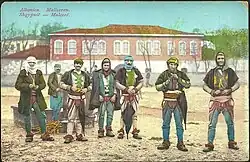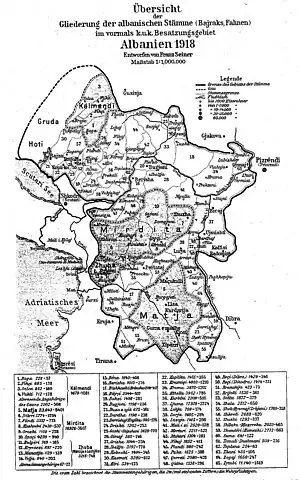Shllaku
Shllak (definite form: Shllaku), is a region of Northern Albania, east of Shkodër whose territory is synonymous with the historic Albanian tribe of the same name.[1][2] Members of Shllaku tribe are Catholics.[3] The region corresponds to today's Shllak Municipality near Shkodër.
| Part of a series on |
| Albanian tribes |
|---|
 |
Geography
The historical region of Shllaku corresponds to Shllak. The tribal region borders the Shkreli, Dushmani and Toplana tribal regions to the north.
Origins
According to tradition, the Toplana, the ancestor of Shllaku as well as of the Gashi can trace their lineage back to 1450 when they arrived in their present area from the territory where now Vasojevići is located in Montenegro.[4][5] Vasojevići tradition traces their origin from around Foča in modern Bosnia and Herzegovina and moved around 1450 to their present location. Thus, Nopcsa and others have arrived to the conclusion that at some point Vasojevići drove southwards the ancestral group of Toplana around this time.[4]
According to tradition, recorded by Nopcsa, the tribal ancestor was named "Can Gabeti", one of four brothers (the others were the founder of the Gashi, Toplana and Megulla).[6] Gabeti, said to have been an Orthodox Christian from Montenegro, came across the original native population who were the ancestors of the Kolë Pep Fura family and whose last male descendant died about 1900.[7] The original population of Shllaku was called Lorehic and is said to be related to the family of the same name in Guri i Zi on the plain of Shkodër.[8]
Shlaku tribe consists of about three hundred houses, all Christian. It is an offshoot of the tribe of Toplana. A third of it lives by charcoal-burning, the others by keeping goats. There is very little cultivable land.
— Durham, Edith (1909). "High Albania". London: Edward Arnold.
History

The earliest available record of the name of the tribe is 'Scelacu' from 1641. Shllaku descends from Toplana tribe. [4][3]
In 1877 Ottoman soldiers from Shllaku attacked Montenegro.[9]
In 1922 this tribe had a population of 1,500.[3]
Notable people
- Bernardin Palaj - Franciscan cleric
See also
References
- Ekmečić 1989, p. 119.
- Haralampie Polenakoviḱ (1976). Bigorski naučno-kulturni sobiri: 1974-1975. Misla. p. 28. Retrieved 21 May 2013.
а потоа: Крај, Скадарските Брда, Дукаѓин, Постриба, Шљак, Никај-Мертури, Гаковечка Мале- сија, Косово итн.;
- Elsie, Robert (2010) [2004], Historical Dictionary Of Albania (PDF) (2 ed.), Maryland: Rowman & Littlefield Publishing Group, p. 416, ISBN 9781282521926, OCLC 816372706
- Durham, Edith (1928). Some tribal origins, laws and customs of the Balkans. pp. 20–21. Retrieved 3 February 2020.
- Zemaljski muzej u Bosni i Hercegovini 1911, p. 373: "Топлана и Шлаку могу као и Гаши своју лозу проследити и до 1450, када су како се вели, дошли из Васојевића у Албанију"
- Elsie 2015, pp. 133, 145, 168.
- Elsie 2015, p. 133.
- Elsie, Robert (30 May 2015). Robert Elsie. ISBN 9781784534011.
- NIN.: Nedeljne informativne novine. Politika. 1991. p. 70. Retrieved 21 May 2013.
Sources
- Milorad Ekmečić (1989). Stvaranje Jugoslavije 1790-1918. Prosveta. p. 119. ISBN 9788607004324. Retrieved 21 May 2013.
...Темоли, Шлаку, Пука, Мертури, Бериша, Тхаћи, Малази, Миридити.
- Zemaljski muzej u Bosni i Hercegovini (1911). Glasnik Zemaljskog muzeja u Bosni i Hercegovini. Zemaljska štamparija. pp. 370–373. Retrieved 21 May 2013.